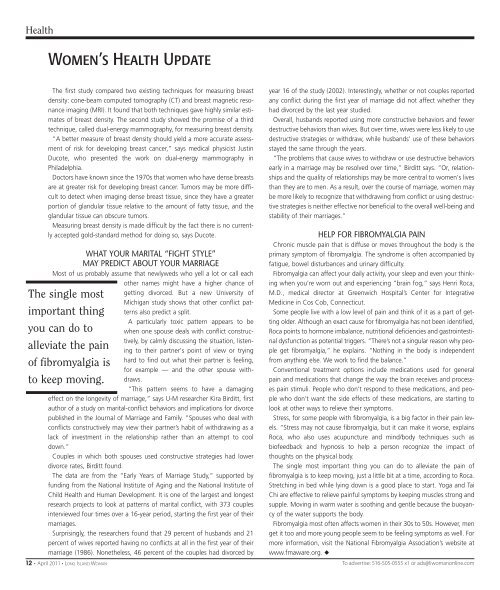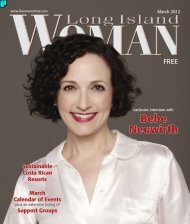Create successful ePaper yourself
Turn your PDF publications into a flip-book with our unique Google optimized e-Paper software.
HealthWomen’s Health UpdateThe first study compared two existing techniques for measuring breastdensity: cone-beam computed tomography (CT) and breast magnetic resonanceimaging (MRI). It found that both techniques gave highly similar estimatesof breast density. The second study showed the promise of a thirdtechnique, called dual-energy mammography, for measuring breast density.“A better measure of breast density should yield a more accurate assessmentof risk for developing breast cancer,” says medical physicist JustinDucote, who presented the work on dual-energy mammography inPhiladelphia.Doctors have known since the 1970s that women who have dense breastsare at greater risk for developing breast cancer. Tumors may be more difficultto detect when imaging dense breast tissue, since they have a greaterportion of glandular tissue relative to the amount of fatty tissue, and theglandular tissue can obscure tumors.Measuring breast density is made difficult by the fact there is no currentlyaccepted gold-standard method for doing so, says Ducote.WHAT YOUR MARITAL “FIGHT STYLE”MAY PREDICT ABOUT YOUR MARRIAGEMost of us probably assume that newlyweds who yell a lot or call eachother names might have a higher chance ofThe single mostimportant thingyou can do toalleviate the painof fibromyalgia isto keep moving.getting divorced. But a new University ofMichigan study shows that other conflict patternsalso predict a split.A particularly toxic pattern appears to bewhen one spouse deals with conflict constructively,by calmly discussing the situation, listeningto their partner's point of view or tryinghard to find out what their partner is feeling,for example — and the other spouse withdraws.“This pattern seems to have a damagingeffect on the longevity of marriage,” says U-M researcher Kira Birditt, firstauthor of a study on marital-conflict behaviors and implications for divorcepublished in the Journal of Marriage and Family. “Spouses who deal withconflicts constructively may view their partner’s habit of withdrawing as alack of investment in the relationship rather than an attempt to cooldown.”Couples in which both spouses used constructive strategies had lowerdivorce rates, Birditt found.The data are from the “Early Years of Marriage Study,” supported byfunding from the National Institute of Aging and the National Institute ofChild Health and Human Development. It is one of the largest and longestresearch projects to look at patterns of marital conflict, with 373 couplesinterviewed four times over a 16-year period, starting the first year of theirmarriages.Surprisingly, the researchers found that 29 percent of husbands and 21percent of wives reported having no conflicts at all in the first year of theirmarriage (1986). Nonetheless, 46 percent of the couples had divorced byyear 16 of the study (2002). Interestingly, whether or not couples reportedany conflict during the first year of marriage did not affect whether theyhad divorced by the last year studied.Overall, husbands reported using more constructive behaviors and fewerdestructive behaviors than wives. But over time, wives were less likely to usedestructive strategies or withdraw, while husbands' use of these behaviorsstayed the same through the years.“The problems that cause wives to withdraw or use destructive behaviorsearly in a marriage may be resolved over time,” Birditt says. “Or, relationshipsand the quality of relationships may be more central to women's livesthan they are to men. As a result, over the course of marriage, women maybe more likely to recognize that withdrawing from conflict or using destructivestrategies is neither effective nor beneficial to the overall well-being andstability of their marriages.”HELP FOR FIBROMYALGIA PAINChronic muscle pain that is diffuse or moves throughout the body is theprimary symptom of fibromyalgia. The syndrome is often accompanied byfatigue, bowel disturbances and urinary difficulty.Fibromyalgia can affect your daily activity, your sleep and even your thinkingwhen you’re worn out and experiencing “brain fog,” says Henri Roca,M.D., medical director at Greenwich Hospital’s Center for IntegrativeMedicine in Cos Cob, Connecticut.Some people live with a low level of pain and think of it as a part of gettingolder. Although an exact cause for fibromyalgia has not been identified,Roca points to hormone imbalance, nutritional deficiencies and gastrointestinaldysfunction as potential triggers. “There’s not a singular reason why peopleget fibromyalgia,” he explains. “Nothing in the body is independentfrom anything else. We work to find the balance.”Conventional treatment options include medications used for generalpain and medications that change the way the brain receives and processespain stimuli. People who don’t respond to these medications, and peoplewho don’t want the side effects of these medications, are starting tolook at other ways to relieve their symptoms.Stress, for some people with fibromyalgia, is a big factor in their pain levels.“Stress may not cause fibromyalgia, but it can make it worse, explainsRoca, who also uses acupuncture and mind/body techniques such asbiofeedback and hypnosis to help a person recognize the impact ofthoughts on the physical body.The single most important thing you can do to alleviate the pain offibromyalgia is to keep moving, just a little bit at a time, according to Roca.Stretching in bed while lying down is a good place to start. Yoga and TaiChi are effective to relieve painful symptoms by keeping muscles strong andsupple. Moving in warm water is soothing and gentle because the buoyancyof the water supports the body.Fibromyalgia most often affects women in their 30s to 50s. However, menget it too and more young people seem to be feeling symptoms as well. Formore information, visit the National Fibromyalgia Association’s website atwww.fmaware.org. ◆12 • April 2011 • LONG ISLAND WOMAN To advertise: 516-505-0555 x1 or ads@liwomanonline.com
















